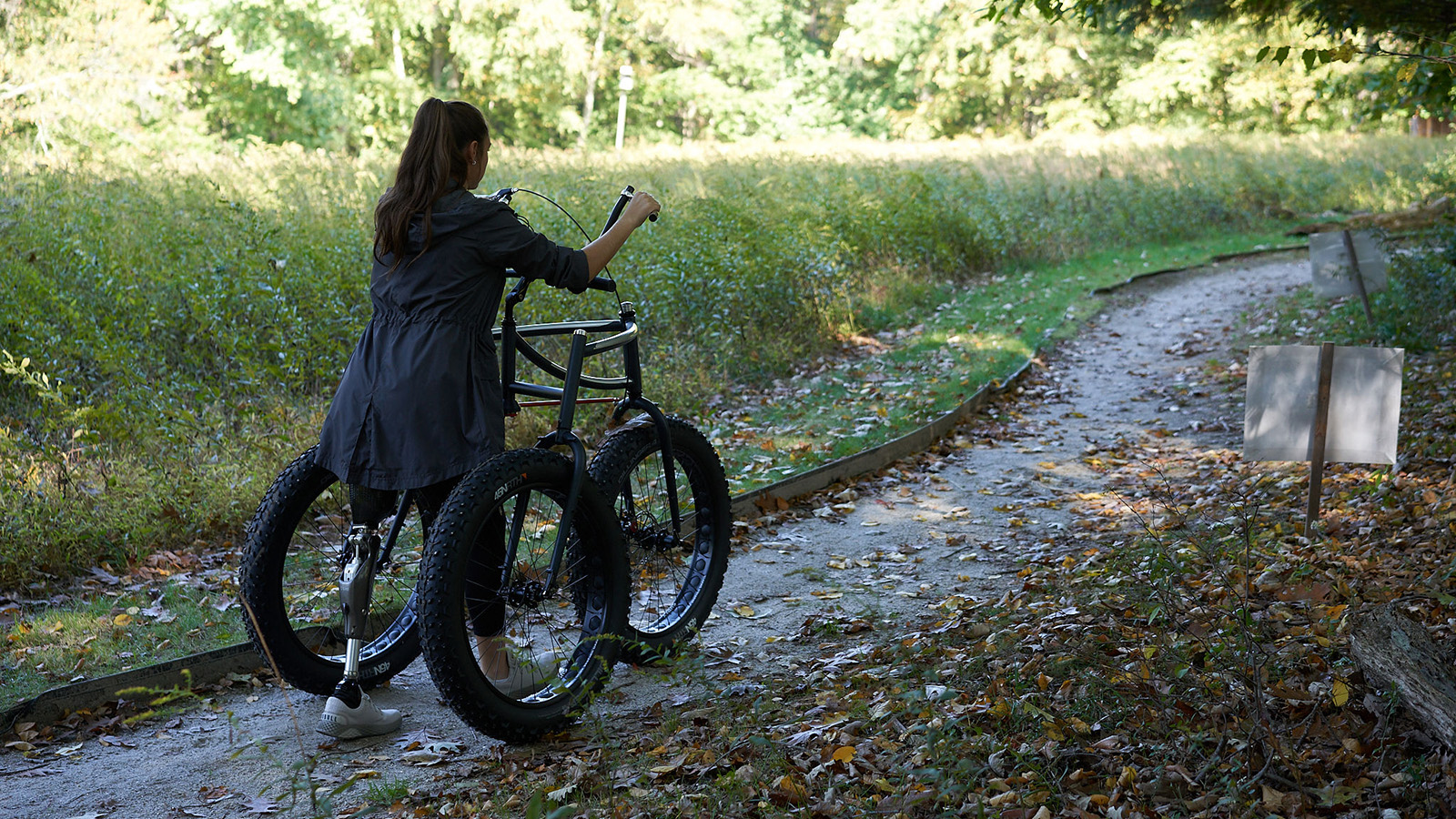
Licensing deal brings Afari mobility device invented by UMaine professors to market
In 2013, professor of interdisciplinary disability studies and social work Elizabeth DePoy had been persuaded by her husband to run in a 5K. She knew she was fit enough to complete the course, but balance challenges had her worried about competing.
She began searching for a device that would allow her to run upright with adequate support and found nothing.
It was then that DePoy turned to her husband, professor of interdisciplinary disability studies and social work Stephen Gilson, and said “Let’s invent something that looks good and that functions.”
What the pair came up with was a sleek, three-wheeled device designed to facilitate upright mobility and help users maintain balance while effortlessly navigating all kinds of terrain. They called it the Afari, and using a prototype built by professor of mechanical engineering Vince Caccese, DePoy completed her 5K. Better still, she came away with a long list of ideas for how to improve it.
Even in its early stages, the Afari attracted significant attention. This was anticipated — DePoy and Gilson knew there was a need for thoughtfully designed products that people with mobility challenges would be proud to use.
“If you go back to the research on the abandonment of mobility devices, even just for walking, you find that one of the major reasons people don’t use them is because they’re ugly,” says DePoy. “Just like any other person, I’m not going to use something I’m embarrassed to use. Another reason people abandon devices is because they don’t function. We wanted something a person would be proud to use and not feel stigmatized. Instead of people looking at you saying ‘Oh, I feel so sorry for you,’ they’re saying ‘What is that? I wish I had one.”
In 2017, the Afari was featured in the Access+Ability exhibition at the Cooper Hewitt, Smithsonian Design Museum in Manhattan. The exhibition highlighted more than 70 innovative designs, exploring “how users and designers are expanding and adapting accessible products and solutions in ways previously unimaginable.”
Initially developed in Maine with engineering support from Ryan Beaumont (‘04, ‘07G), principal of R.M. Beaumont Corporation, the Afari has gone through numerous design iterations since its Smithsonian debut.
Now, the Afari has been exclusively licensed for production and sale by Mobella, a company founded to commercialize stylish, functional mobility solutions for people with active lifestyles.
Mobella founder Henry Kaufman saw potential in the Afari from the start. Kaufman purchased an early model of the device after losing significant mobility to Guillain-Barre Syndrome. Not one to be sidelined from the active and engaged life he was used to living, Kaufman sought new ways to do the things he enjoyed.
“I had started to design mobility assistance products of my own — I wanted to be able to have things that were beautiful and that I could be proud to use,” says Kaufman. “Then, I saw the Afari at the Cooper Hewitt exhibition and I knew I had to have one. When I finally received my Afari, it was even better than I had imagined. When I walk with my Afari along the river near my home, I feel like I am flying!
“When we launched Mobella, I knew the Afari needed to be part of our portfolio, and we are thrilled with the partnership we have with the team at UMaine who made it happen. Afari reflects the spirit of Mobella and is the first of many very cool products we will bring to our customers.”
Two versions of the Afari are available at GoMobella.com – the “commuter” is intended for use on firmer terrain, such as sidewalks and paved paths, while the “off-road” will also handle softer, looser surfaces, such as sand and snow.
For DePoy and Gilson, the match with Mobella is ideal because of Kaufman’s commitment to centering beautiful, non-stigmatizing design and functionality with customization to meet individual users’ needs and wants.
“Mobella is creating a range of ways to individualize their products,” says Gilson. “It’s not just one size fits all. We don’t buy into the notion of universal design, and Mobella gets that. If you make this product and allow people to customize it according to their needs and desires, it begins to build in choice on a wider scale.”
That choice, says DePoy, is crucial, and it has informed all their work with the Afari and on new products the professors are developing.
“This is the first device we sought to create, and we still are creating,” says DePoy. “We make products for people who want to be mobile. That’s not just about movement. It’s about continuing to live your life without having somebody tell you ‘Oh no, you can’t,’ or thinking ‘Oh no, I can’t.’ If you are a typical shopper, you have a choice of what product you want to buy, what you want it to look like. Everybody should have that choice.”
Contact: Ashley Forbes, ashley.forbes@maine.edu
